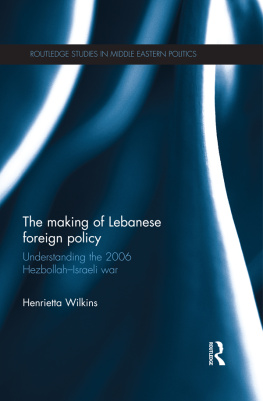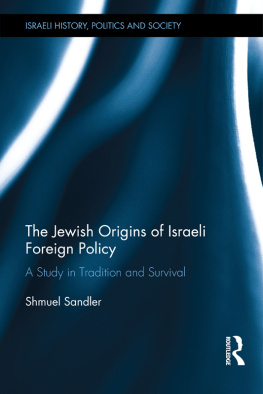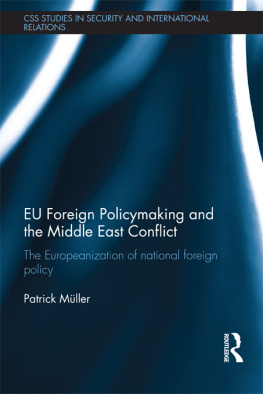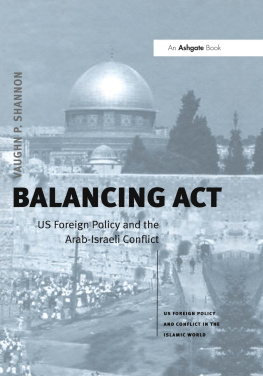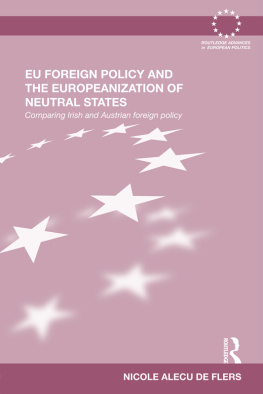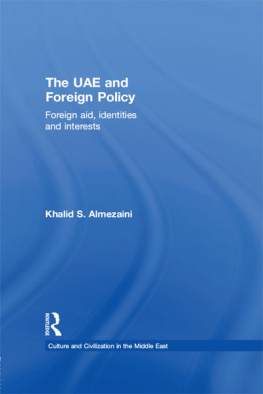ISRAELI FOREIGN POLICY
Perspectives on Israel Studies
S. ILAN TROEN, NATAN ARIDAN, DONNA DIVINE, DAVID ELLENSON, ARIEH SAPOSNIK, AND JONATHAN SARNA, EDITORS
SPONSORED BY
The Ben-Gurion Research Institute for the Study of Israel and Zionism of the Ben-Gurion University of the Negev
AND THE
Schusterman Center for Israel Studies of Brandeis University
This book is a publication of
Indiana University Press
Office of Scholarly Publishing
Herman B Wells Library 350
1320 East 10th Street
Bloomington, Indiana 47405 USA
iupress.indiana.edu
2020 by Uri Bialer
All rights reserved
No part of this book may be reproduced or utilized in any form or by any means, electronic or mechanical, including photocopying and recording, or by any information storage and retrieval system, without permission in writing from the publisher. The paper used in this publication meets the minimum requirements of the American National Standard for Information SciencesPermanence of Paper for Printed Library Materials, ANSI Z39.48-1992.
Manufactured in the United States of America
Cataloging information is available from the Library of Congress.
ISBN 978-0-253-04620-8 (hardback)
ISBN 978-0-253-04621-5 (paperback)
ISBN 978-0-253-04622-2 (web PDF)
12345252423222120
Behold, it is a people that shall dwell alone, and shall not reckon itself among the nations.
Numbers 23:9
Contents
T HIS BOOK REPRESENTS an effort to summarize a multifaceted academic activity that began in the late 1980s. While working in this field of study over the course of more than three decades, I have gained immensely from the advice, criticism, and encouragement of many. I owe deep thanks to Shlomo Avineri, Avraham Sela, Yoseph Heller, Gadi Heimann, Raymond Cohen, Gabi Sheffer, Kobi Metzer (Hebrew University); Tuvia Frueling and Natan Aridan (Ben-Gurion University); Itamar Rabinovitch, Motti Golani, Yaacov Roi, Aharon Klieman, and David Vital (Tel Aviv University); Zach Levey (Haifa University); Stuart Cohen (Bar Ilan University); Yoav Gelber (Interdisciplinary Center); Yehoshua Freundlich, Yemima Rosenthal, and Gilad Livne (Israel State Archives); Baruch Tor-Raz (Israel Labor Party Archive); Yoram Mayorek (Central Zionist Archives); Yitzhak Minerbi, Arie Levin, Binyamin Navon, Yosef Lamdan, Shimon Stein, Nimrod Barkan, Haim Koren, and Yaacov Amitai (Israeli Foreign Ministry); Mordechai Ben-Porath and Shlomo Hillel (Mossad LeAliyah Beth); Elad Van Gelder (Israeli Prime Ministers Office); Yair Tzaban (Israeli Cabinet); and Ben Cohen.
Donna Robinson Divine, Alan Dowty, and Robert Freedman offered thoughtful and perceptive comments as readers of the draft book. Merav Datan provided considerable help as a highly professional translator. Dee Mortensen and Ashante Thomas of Indiana University Press greatly assisted in preparing the typescript for print. The Schusterman Center at Brandeis University, the Israel Academy of Science, and the Israel Institute offered moral and generous financial support, which facilitated the research and production of the book.
Last but not least, I owe the deepest gratitude to Ilan Troen of Brandeis University and Ben-Gurion University, who presented me with the very rewarding challenge of writing this book and whose insightful criticism, advice, and constant support throughout its writing have made it all happen.
The book is dedicated to my grandchildrenGuy, Tal, Alma, Eden, Adam, Amos, Imri, Alona, Zohar, and Keshetwhose grandfathers strange endeavors have naturally been far beyond their grasp. Yet they are so close to my heart.
Let them never dwell alone.
Jerusalem, January 2019
ISRAELI FOREIGN POLICY
M Y INTEREST IN the history of Israels foreign policy is informed by four sources. The first was a class taught by Professor Michael Brecher in 1970, which I attended as a masters student at the Hebrew University. Professor Brecher was among the first in Israel and in the world to address this issue as an academic subject. In two books published in the ensuing four years, The Foreign Policy System of Israel: Setting, Images, Process (1972) and Decisions in Israels Foreign Policy (1974), he laid the foundations for the discipline, and these foundations are still standing today. The topic inspired meone of his first studentsto write a masters thesis under his supervision on the roles of David Ben-Gurion and Moshe Sharett in the decision-making process that led to Israels 1948 declaration of statehood. During this time I met personally on several occasions with Israels first (and by then former) prime minister, who granted me access to classified state documents in his possession. In 1971, while still a masters student, I published my first academic article based on this research.
The second source that drew me to study this issue, four years later, was my service of several years as a founder and senior researcher in the Foreign Ministrys Department of Research and Policy Planning, established in the aftermath of the Yom Kippur War. The work exposed me to the making of Israeli foreign policy in real time. Shortly thereafter I joined the International Relations Department of the Hebrew University, the third source of my interest, where I gained access to Israeli state documents that had just become available thanks to a law permitting the disclosure of government documents thirty years after an event. Consequently, I abandoned my research on Britains foreign and defense policy during the two world wars, which I had been pursuing since the days of my doctoral studies at the University of London. The new material fascinated me and has since become the core of my academic work, a focus of my publications, and a central theme of the courses I have taught. At my initiative, the subject became a required course for BA students in international relations at the Hebrew University, which for years I have taught jointly with my colleague and friend Professor Avraham Sela. The fourth source of my interest was my service of more than twenty-five years as a reserves officer in the Strategic Planning Division of the Israel Defense Forces (IDF). The experience opened my eyes to the realities of Israels foreign and defense policy and greatly enriched my insights into the history of this policy.
My research to date has centered on unknown aspects of this subject within clearly defined and relatively brief historical periods, drawing almost exclusively on primary sources and newly available documents. These studies were published, for the most part, in three books: Between East and West: Israels Foreign Policy Orientation, 19481956 (1990), Oil and the Arab Israeli Conflict, 194863 (1999), and Cross on the Star of David: The Christian World in Israels Foreign Policy, 19481967 (2005).
This book, in contrast, offers a synthesis of existing literature as well as a broader chronological expanse. As such, it represents my first attempt at writing in this genre. The book is based primarily on the works of many other authors and aims to present my personal, partial selection of findings from the rich literature that already exists regarding this subject.
For numerous complex reasons, Israels foreign policy is a relatively recent field of historical study, so a few historiographical comments are necessary at the outset. During its first years of statehood, Israel retained many patterns of secrecy that had been characteristic of the



